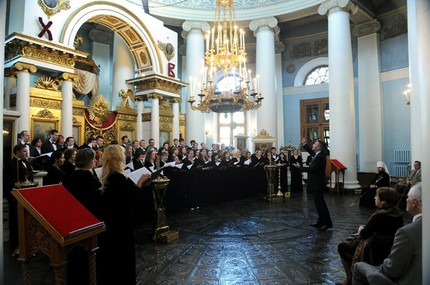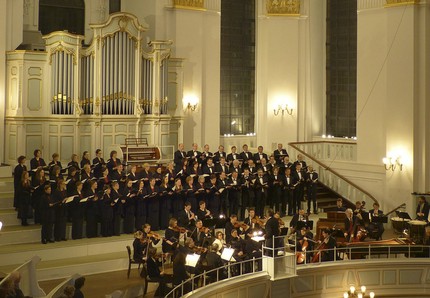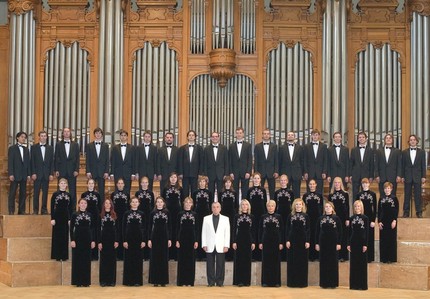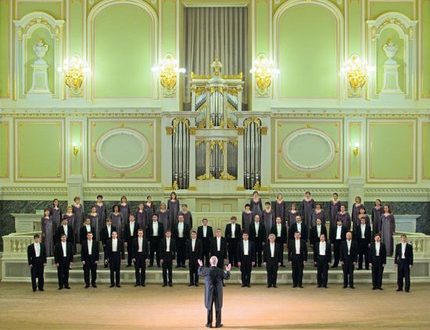
Synodal Choir |
Synodal Choir

One of the oldest Russian professional choirs. It was created in 1710 (according to other sources, in 1721) on the basis of the male choir of the patriarchal choristers (Moscow). Founded at the end of the 16th century, it was famous for its excellent singers selected from other church choirs; along with singing in the church, he also performed at court festivities.
The synodal choir initially consisted of 44 male singers, and in 1767 children’s voices were introduced. In 1830, the Synodal School was opened at the Synodal Choir (see Moscow Synodal School of Church Singing), in which juvenile singers accepted into the choir began to study. In 1874, the school was headed by the regent D. G. Vigilev, who did a lot for the musical development of the choristers.
The turning point in the history of the Synodal Choir was 1886, when the choral conductor V. S. Orlov and his assistant A. D. Kastalsky came to the leadership. The director of the Synodal School in the same period was S. V. Smolensky, under whom the level of training of young choristers increased significantly. The energetic work of three prominent musical figures contributed to the growth of the choir’s performing skills. If before the activity of the Synodal Choir was limited to church singing, now it began to take part in secular concerts. Orlov and Kastalsky introduced young singers to the Russian folk song tradition, introduced them to the Znamenny chant, untouched by later harmonic processing.
Already at the first concerts, held in 1890 under the direction of Orlov, the Synodal Choir proved to be a wonderful performing group (by this time there were 45 boys and 25 men in its composition). The repertoire of the Synodal Choir included works by Palestrina, O. Lasso; he took part in the performance of works by J. S. Bach (Mass in h-moll, “St. Matthew Passion”), W. A. Mozart (Requiem), L. Beethoven (finale of the 9th symphony), as well as P. I. Tchaikovsky, N. A. Rimsky-Korsakov, S. I. Taneyev, S. V. Rachmaninov.
Of great importance for the artistic development of the group was the creative communication with him of Moscow composers – S. I. Taneeva, Vik. S. Kalinnikov, Yu. S. Sakhnovsky, P. G. Chesnokov, who created many of their works with the expectation that they would be performed by the Synodal Choir.
In 1895 the choir performed in Moscow with a series of historical concerts of Russian sacred music from V. P. Titov to Tchaikovsky. In 1899, a concert of the Synodal Choir in Vienna was held with great success. The press noted the rare harmony of the ensemble, the beauty of the gentle children’s voices and the powerful heroic sonority of the basses. In 1911 the Synodal Choir under the direction of HM Danilin toured Italy, Austria, Germany; his performances were a true triumph of Russian choral culture. A. Toscanini and L. Perosi, leader of the Sistine Chapel in Rome, spoke enthusiastically about the Synodal Choir.
Famous Soviet choirmasters M. Yu. Shorin, A. V. Preobrazhensky, V. P. Stepanov, A. S. Stepanov, S. A. Shuisky received artistic education in the Synodal Choir. The synodal choir existed until 1919.
The Moscow Synodal Choir was revived in the spring of 2009. Today, the choir is led by the Honored Artist of Russia Alexei Puzakov. In addition to participating in solemn divine services, the choir performs with concert programs and takes part in international festivals.
References: Razumovsky D., Patriarchal choristers and clerks, in his book: Patriarchal choristers and clerks and sovereign choristers, St. Petersburg, 1895, Metallov V., Synodal, former patriarchal, choristers, “RMG”, 1898, No 10-12 , 1901, No. 17-18, 19-26; Lokshin D., Outstanding Russian choirs and their conductors, M., 1953, 1963. See also literature under the article Moscow Synodal School of Church Singing.
T. V. Popov





